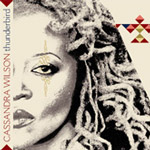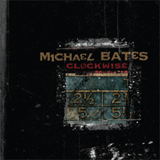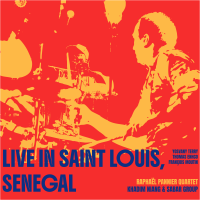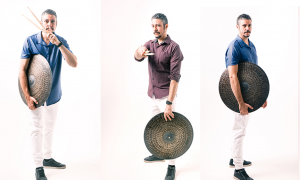Home » Jazz Articles » Interview » Cassandra Wilson: Creating Loverly Sound
Cassandra Wilson: Creating Loverly Sound
I say that I'm a musician, and jazz is my discipline.
 The deep, rich voice of Cassandra Wilson, now among the most exalted of jazz vocalists, is something to savor. She has an adventurous spirit when it comes to her music, and whether playing with original melodies, or turning others songs—of jazz, folk, blues or pop origin—inside out, it's always something to relish, like a fine brandy that can be felt sweetly burning down to the stomach then spreading the glow back up where it can be felt warming the ears.
The deep, rich voice of Cassandra Wilson, now among the most exalted of jazz vocalists, is something to savor. She has an adventurous spirit when it comes to her music, and whether playing with original melodies, or turning others songs—of jazz, folk, blues or pop origin—inside out, it's always something to relish, like a fine brandy that can be felt sweetly burning down to the stomach then spreading the glow back up where it can be felt warming the ears.
Wilson's latest recording released over the past summer, Loverly (Blue Note, 2008), is a delicious treat, moving her back to the realm of standards, something she hasn't done in a while—since Blue Skies (JMT, 1988), in fact. As always, she gives them an individual fingerprint, but doesn't always stray all that far off the path. It's a delightful offering, done with friends that include longtime colleagues guitarist Marvin Sewell and bassist Lonnie Plaxico, as well as pianist Jason Moran, drummer Herlin Riley and percussionist Lekan Babalola, with bassist Reginald Veal and trumpeter Nicholas Payton guesting in spots.
"I just looked to the guys that I usually like to hang out with," she says of her foray back to standard American songs. "They are my favorite musicians that I enjoy hanging out with; whose interaction I enjoy seeing and being a part of. Personally, I think this disk is more about that than it is about me."
The arrangements are spare, though many are unique. She wanted it that way. Acknowledging that she doesn't record standards often, she said an understanding of each tune is needed before taking them on. A listen to the CD proves she has developed an insight with her selections, and her band mates helped her achieve a great sound.
"Lover Come Back to Me" is an up-tempo version, with Wilson slightly behind the beat, telling the story with a tight rhythm section but no horns. Sewell is strumming like Freddie Green in the Count Basie band, and the virtuoso solo comes from Moran's fleet fingers. Payton makes a brief statement before filling up the windows between Wilson's improvised expressions.

"Black Orpheus"—actually "Maha de Carnival" or "A Day in the Life of a Fool" from the 1959 film Black Orpheus—is taken at a slow, sensuous tempo, where Wilson gets to put her deep sonorous sound on display with little ornamentation. The title cut is a mid-tempo romp and "Caravan" is exotic. "St. James Infirmary" is funky and spry, with more musical intricacy in its rendering then usually heard in that New Orleans song. The tricky, and beautiful "Spring Can Really Hang You Up the Most," is a superb example of less-is-more. Backed only by Sewell's acoustic guitar, the singer is laid bare, and presents a luscious treatment of the melancholy story. Her voice is one of the pleasures of jazz.
Of course, the Jackson, Mississippi native is a complete musician, studying piano from the age of six to thirteen and gaining experience playing clarinet in middle school concert and marching bands. She also attended Millsaps College and Jackson State University, and has a degree in mass communications that she actually put to use when she moved to New Orleans in 1981, not really planning on diving into a career in music.
When she did jump into music, she took her influence from the likes of Abbey Lincoln and Betty Carter, eventually hooking up with the M-Base collective. "Great. Crazy. I would say it's one of the best times of my life. One of the best times as a musician," she says—hence her penchant for really digging into and deconstructing melodies and harmonies at times.
For her first recording since Thunderbird (Blue Note, 2006), she took a little different approach to get a certain special feeling. She took a house in her hometown, converting rooms into makeshift recording studios and a control room. The musicians and crew set up shop for six days, eating together and hanging. Wilson hoped it would create a chemistry that would rub off for the listener.
It appears she was right.
"It was a democratic process, except for the business aspect of it. Of course, I have to be the coordinator," she says, adding "I trust those men with my life, all of them."
Selection of the tunes was part of that democracy. "Lonnie [Plaxico] and I would get together and talk about the list. And Lonnie might say, 'Cassandra, do you know this song?' Then I might say, 'Yeah, I know that song. I don't remember the lyrics,'" she says, chuckling at the memory. "He might go and talk to the drummer. 'Till There was You' was that process. It's a song that wasn't on a list. It happened and it's special."
The disk even contains a blues from Robert Johnson, "Dust My Broom," but that's no surprise, as blues has always been close to her heart. But her musical interests have always been very broad, and it comes out in her own composing.
"I kind of think of everything I've heard since I was five years old," she says about devising music. "I've been making up songs since I was a little girl."

Now, as she "makes them up," she says a harmony or melody she may hear in her head, or a lyric idea that might come to mind, can all lead to a new composition. But bass lines are always prominent in the process. "I like to feel things from the bass line, from the bottom."
It's common to find non-jazz selections among Wilson's body of work. She doesn't pay much attention to such labels, but notes and admits that close association with jazz that is always with her. Her musical influences are wide-raging, but, she notes that outside of the singers she has been touched by, "I love Miles Davis, mostly."
"Jazz is a culture," she says. "Though it wasn't common when I was coming of age, it was still very much a part of the fabric of what I listened to. I say that I'm a musician, and jazz is my discipline. You have to be connected to the community in order to have the discipline. It requires a certain amount of discipline."
As for jazz in general, and the state of the music business, Wilson is aware of changes and controversies, but remains calm. "I know that jazz always goes through phases," she says. But she's confident in the future. "There was a Miles Davis, then a Wynton Marsalis. There are people out there and things that have happened in each decade."
She says her touring will include songs from Loverly, but also samples of her other work.
"You always have to keep some of the chestnuts," she says of her repertoire with a wry laugh, "if I can call them that. I don't know if they're old enough to be called chestnuts. I try to keep some of the old repertoire together. It's difficult when you get a new band and you start dealing with a new sound, it's hard to go back and repeat certain aspects of, like, the double guitar thing [on some of her recordings where two guitars were used]."
 l:r: Reginald Veal, Marvin Sewell, E.J. Strickland, Cassandra Wilson, Lekan Babalola
l:r: Reginald Veal, Marvin Sewell, E.J. Strickland, Cassandra Wilson, Lekan Babalola
So, Wilson is comfortable with her place at the moment and happy to be going out with her musicians.
"I am very happy. I'm very content. I like it that I'm going on the road," she says. "I enjoy traveling and performing. I think as I get older, I enjoy that more."
Selected Discography:
Cassandra Wilson, Loverly (Blue Note, 2008)
Cassandra Wilson, Thunderbird (Blue Note, 2006)
Cassandra Wilson, Glamoured (Blue Note , 2004)
Cassandra Wilson, Belly of the Sun (Blue Note , 2002)
Cassandra Wilson, Traveling Miles (Blue Note , 2000)
Cassandra Wilson with Jacky Terrasson, Rendezvous, (Blue Note, 1997)
Cassandra Wilson, Songbook (Universal, 1996)
Cassandra Wilson, New Moon Daughter, (Blue Note, 1995)
Cassandra Wilson, Blue Light 'Til Dawn , (Blue Note, 1993)
Cassandra Wilson, Dance to the Drums Again, (Sony, 1992)
Cassandra Wilson, After the Beginning Again, (Polygram, 1991)
M-Base Collective, Anatomy of a Groove, (DIW Records, 1991)
Cassandra Wilson, She Who Weeps (Polygram, 1990)
Cassandra Wilson, Jumpworld, (Polygram, 1989)
Cassandra Wilson, Blue Skies, (Polydor, 1988)
Steve Coleman & Five Elements, World Expansion, (Winter and Winter, 1986)
Steve Coleman & Five Elements, On the Edge of Tomorrow, (Winter and Winter, 1985)
Steve Coleman, Motherland Pulse, (Polydor, 1985)
Photo Credit
John Kelman (collective shot)
Tags
PREVIOUS / NEXT
Support All About Jazz
 All About Jazz has been a pillar of jazz since 1995, championing it as an art form and, more importantly, supporting the musicians who make it. Our enduring commitment has made "AAJ" one of the most culturally important websites of its kind, read by hundreds of thousands of fans, musicians and industry figures every month.
All About Jazz has been a pillar of jazz since 1995, championing it as an art form and, more importantly, supporting the musicians who make it. Our enduring commitment has made "AAJ" one of the most culturally important websites of its kind, read by hundreds of thousands of fans, musicians and industry figures every month.






















